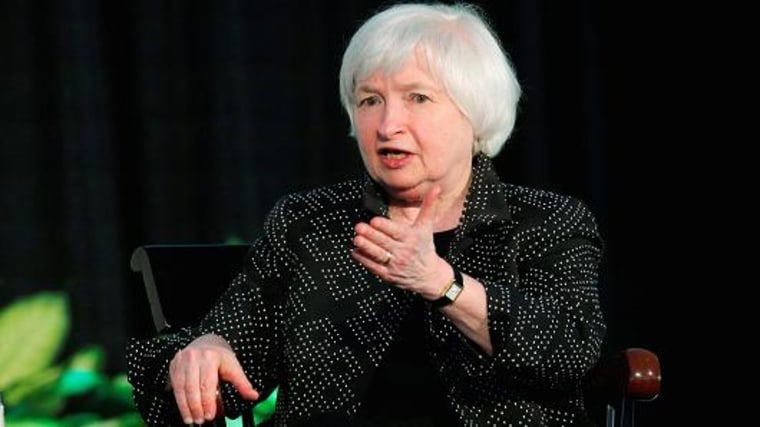Federal Reserve Chair Janet Yellen struck a generally positive tone on the U.S. economy on Monday — despite last week's disappointing jobs report.
Speaking at an event in Philadelphia, Yellen continued to say the Fed needs to raise rates, but she stepped back from putting a time period on that plan.

The Fed funds rate probably needs to rise gradually over time, she said, and hikes should come before all of the central bank's economic goals have been fully reached. There was one key section of the speech she prepared Monday that strongly signaled two hikes on the way:
"Next week, concurrent with our policy meeting, the FOMC participants will release a new set of economic projections. Those could, of course, differ from the previous set of such projections in March. But speaking for myself, although the economy recently has been affected by a mix of countervailing forces, I see good reasons to expect that the positive forces supporting employment growth and higher inflation will continue to outweigh the negative ones."
The translation is fairly simple: Each quarter, the Federal Open Market Committee releases its Summary of Economic Projections, which is basically where members feel the economy is going and what the likely path of the Fed's interest rate target will be.
At the March meeting, FOMC officials indicated that two rate hikes are likely this year. Yellen's remarks indicate her opinion has not changed since then.
And with the chair highly adept so far at consensus building, the likelihood should increase that the Fed will hike rates twice this year.
Heading into the Yellen speech, the market was assigning very little chance of a hike this summer — just a six percent probability for June and 39 percent for July. September had a 52 percent probability. But the CME's Fed tracker was indicating just a 21 percent chance for a second hike by December. Those probabilities could now shift considerably.
Yellen also warned against overreacting to one monthly report, saying the overall labor market is quite positive. Although the recent slowdown in jobs bears "close watching," she said, wage growth may "finally be picking up."
"Although this recent labor market report was, on balance, concerning, let me emphasize that one should never attach too much significance to any single monthly report," she said in prepared remarks.
Still, Yellen said that an important theme of her remarks is the "inevitable uncertainty surrounding the outlook for the economy."
"The uncertainties are sizable, and progress toward our goals and, by implication, the appropriate stance of monetary policy will depend on how these uncertainties evolve," she said.
Key areas of uncertainty, she said, include the resilience of domestic demand, the international economic situation, productivity growth and the inflation outlook.
On domestic investment, Yellen said she suspects there's a "transitory element" to recent weakness, but she acknowledged that labor market data "raise the less favorable possibility that firms may instead have decided to expand their operations more slowly."
On the international front, Yellen said she is optimistic that foreign headwinds are fading, but added that the chance of a so-called "Brexit" could have "significant economic repercussions."
Monday was the Fed chair's last chance to offer insight into Fed thinking before a media blackout takes effect ahead of the June 14-15 monetary policy meeting.
Near the conclusion of her remarks, Yellen offered a series of questions with which she and her central bank colleagues expect to grapple following the recent labor data.
"Is the markedly reduced pace of hiring in April and May a harbinger of a persistent slowdown in the broader economy? Or will monthly payroll gains move up toward the solid pace they maintained earlier this year and in 2015? Does the latest reading on the unemployment rate indicate that we are essentially back to full employment, or does relatively subdued wage growth signal that more slack remains?" she asked.
The Fed raised its key benchmark interest rate in December for the first time in nearly a decade, but has held off since then due to concerns earlier this year about a global economic slowdown and financial market volatility.
Read More From CNBC: We're in for a June Swoon After Jobs Shock, Wall Street Bull Says